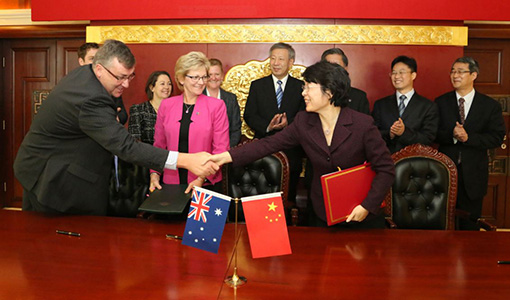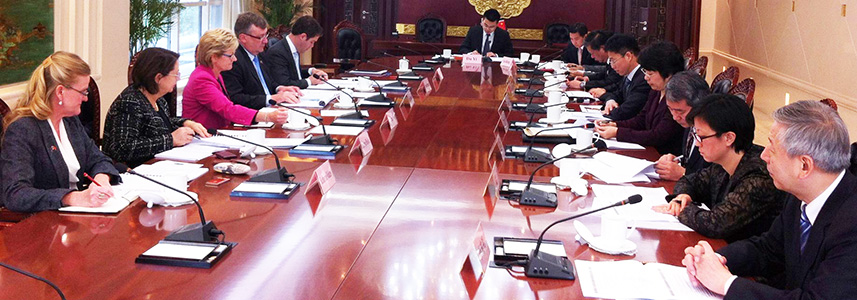7 January 2014
Sustained and productive government-to-government relations continue to support education exchange and cooperation with China. Anne Baly, Group Manager, International Group, Department of Education, and Craig Robertson, Head of Skills Connect Division, Department of Industry travelled to China in early November to participate in the China Annual Conference for International Education. Ms Baly and Mr Robertson gave presentations on Australia’s Outbound Mobility to Asia and the Australian Experience of Skilling Industry for Restructuring.
The China Annual Conference for International Education is a multi-faceted conference and expo covering all aspects of education. The conference involved around 200 delegates including policy-makers and representatives from Chinese and overseas education institutions. In addition to Australian Government representatives, Universities Australia and TAFE Directors Australia were also represented at the conference. So too were the Australian participants of the 2013 China Australia Executive Leadership “shadowing” Programme.
In conjunction with Ms Baly and Mr Robertson’s visit to China, senior officials’ talks were held with counterparts in the Ministry of Education (MoE) and affiliated agencies. Both sides provided briefings on key policy and administrative changes since the group’s last meeting in Australia in 2011.
Having achieved a significant expansion of its education system, China is now focused on improving the quality of its education sector and sees collaboration with foreign partners as a key mechanism to achieve this. China also aims to boost the number of international students - setting a target of 500,000 by 2020 (it reached 330,000 by 2012). In this context, Australia's plans to encourage more students to study in China through the New Colombo Plan were warmly received.
Officials agreed to collaborate on a number of activities over the next two years, including continued support for two-way student, researcher and professional mobility; stronger government-to-government engagement on vocational education and training; and strengthening collaboration on quality assurance. The Ministry of Education used the opportunity to emphasise the Chinese Government’s renewed efforts to improve system wide quality.
The Ministry made particular mention of the development of quality Sino-foreign joint programmes. Joint programmes are viewed by China as a positive force for reform, as long as they continue to meet Chinese regulatory requirements with respect to substantial international content and national education priorities.
With the support of the Ministry of Education, the Chinese Education Association of International Exchange established the Commission on Chinese-foreign Cooperation in Education (CEAIE-CCCE) to assist in ensuring and enhancing the quality of joint programmes and promoting better collaboration between Chinese and foreign institutions.
With a total of 408 joint programmes with Chinese education partners, including 134 joint programmes and three joint schools approved to offer courses at bachelor or above, Australia’s competitiveness in Sino-foreign joint ventures is very strong.
 Pictured: Mr Craig Robertson, Head of Skills Connect Division, Department of Industry, Ms Anne Baly, Group Manager, International Group, Department of Education and representatives from the Ministry of Education, China.
Pictured: Mr Craig Robertson, Head of Skills Connect Division, Department of Industry, Ms Anne Baly, Group Manager, International Group, Department of Education and representatives from the Ministry of Education, China.
